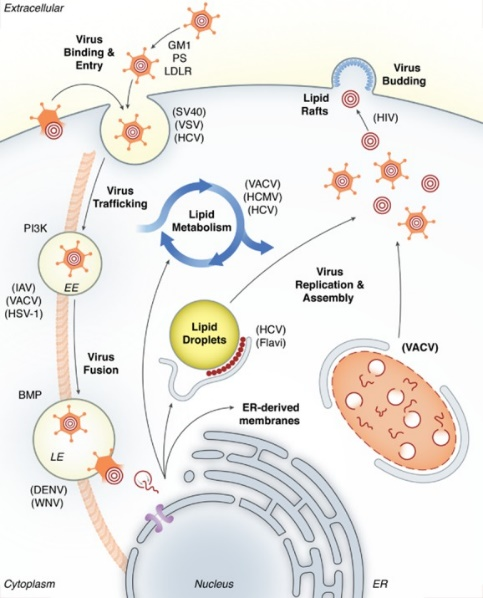Lipidomics Analysis of Virus Infections
As the main components of the cell membrane and lipid droplets, lipids with various structures play an important role in a wide range of biological processes, such as signal transduction, transport, and the separation of biological macromolecules with different biochemical properties. With the rapid development of lipidomics in recent years, scientists have gradually separated the study of lipidomics from metabolomics. Creative Proteomics is an international contract research organization (CRO). We continue to expand our services and improve our existing resources to help our customers accelerate their research and support their projects. Since lipids play critical roles in stages of virus replication, we have established a robust platform with validated lipid coverage and stable liquid chromatography-mass spectrometry (LC-MS) system for lipidomic analysis of viral infections.
Lipids are critical to viral replication
 Fig1. Virus-mediated subjugation and modulation of host lipids during infection. (Mazzon, M., & Mercer, J., 2014)
Fig1. Virus-mediated subjugation and modulation of host lipids during infection. (Mazzon, M., & Mercer, J., 2014)
Generally, there are five phases of viral replication within the host cells, including attachment, entry/penetration, replication, maturation/assembly, and release. During the stages, viruses take advantage of a repertoire of host cell lipids to complete their life cycle. Lipids can be used as receptors or co-factors for virus entry, components or regulators of viral replication complex, and signaling factors for the distribution of viral protein in cells and the transport, assembly, and release of viral particles. It is reported that both reduced and oversupplied lipogenesis enzymes can disrupt efficient virus replication, suggesting that the intact lipid landscape induced by viral infection is necessary for optimal viral replication. Lipid profiles of host cells infected with many viruses have yet to be fully characterized.
Lipidomics facilitates our understanding of viral infections
Lipidomics is the investigation of a comprehensive map of all lipids (the lipidome) within a cell or organism. In recent years, the application of lipidomics has benefited greatly from the advances in mass spectrometry (MS) methodologies. The MS-based method enables the identification of hundreds and thousands of lipids in biological matrices. Lipidomics studies have shown that viral infection can significantly change the lipid group of the host, thus elucidating the potential pathogenic mechanism.
Applications of lipidomics analysis
- Elucidating the potential pathogenic mechanism
- Discovery of new biomarkers and viral disease diagnosis
- Pormoting the development of lipid-targeted therapies
Service offering
Based on liquid mass spectrometry (LC-MS) technology, our experimental process of lipidomics research mainly includes sample collection, lipid extraction, LC-MS/MS detection, and data analysis. Our unbiased lipidomics approach is reliable and fast in identifying significant differences in the host lipid profiles during virus infection.
Benefits of our lipidomics analysis services
- Enhanced selectivity and reduced the overlap of the same amount of ectopic elements due to the optimized lipid separation method
- Provides accurate and fast lipid analysis with lossless resolution or sensitivity
- According to accurate MS and MS/MS fragmentation pattern data in multiple databases, such as LIPD MAPS and Human Metabolome Database, our software enables direct identification and characterization of lipid data
The workflow of our services

Creative Proteomics has been developing metabonomics and lipidomics detection and data analysis methods for many years. Please feel free to contact us for more information about our services. We look forward to working with you on your next project.
References
- Kyle, J. E. (2021). "How lipidomics can transform our understanding of virus infections." Expert Review of Proteomics, (just-accepted).
- Mazzon, M., & Mercer, J. (2014). "Lipid interactions during virus entry and infection." Cellular microbiology, 16(10), 1493-1502.
* For research use only.

 Fig1. Virus-mediated subjugation and modulation of host lipids during infection. (Mazzon, M., & Mercer, J., 2014)
Fig1. Virus-mediated subjugation and modulation of host lipids during infection. (Mazzon, M., & Mercer, J., 2014)